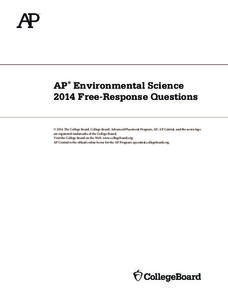Virginia Department of Education
Succession
The final lesson in a two-part series prompts scholars to create newspaper articles and succession events. Applying their knowledge of the ecosystem and the past examples of succession, they predict what will happen in the future using...
College Board
2014 AP® Environmental Science Free-Response Questions
Less than half of AP Environmental Science test takers pass each year. The College Board releases previous test questions covering topics from greenhouse gases to ecological succession to help scholars prepare for future assessments. Use...
Curated OER
Ecological Organization
Students study biomes and their major characteristics. In this biomes lesson students draw a climatogram and discuss climate of a specific area.
Curated OER
Sample Midyear Examination (Chemistry and Biology)
A 12-page midterm exam sample can be given to young scientists in preparation for an exam. This particular installment is geared toward a class that delves into both ecology and chemistry concepts. There is no way to separate the 50...
Curated OER
Succession and Experimental Process
Students describe the roles of controlled, manipulated and responding variables in scientific research. They also identify biotic and abiotic interactions affecting the makeup of a plant community.
Curated OER
Field Experiments on Succession
Student develop a hypothesis regarding the effects of either mowing or fertilizer upon the diversity of plant species in a grassland ecosystem. They set up experiment field plots and measure species richness.
Curated OER
Ecology and Ecosystem "Circus"
Students examine different ecosystems and how they are maintained. In this biology lesson students work in groups are given a targeted area and identify the most important principles and concepts for that area.
EnLiST
Trap Your Own Insects: What’s in Your Backyard?
Young entomologists construct three types of insect traps—pitfall, pollinator, and panel—before setting their traps out and observing what they caught. They then observe what types of insects the different traps attract.
Curated OER
What is Wrong with My Pond?
Middle schoolers examine various pond water samples to identify water quality. In this water quality lesson, students will identify levels of nitrates, ammonia, pH, hardness,and alkalinity in pond water. They will explain importance of...
Curated OER
A Reef of Your Own
Students research and study the life and reproductive strategies of reef building corals. They examine how coral reefs can produce high levels of biological material when they are surviving in areas of low nutrition.
Curated OER
EcoFluxx
Students describe examples of predator/prey relationships in nature explain how some animals protect themselves from predation better follow all directions presented to them become more flexible, adaptable and literate learners. They...












